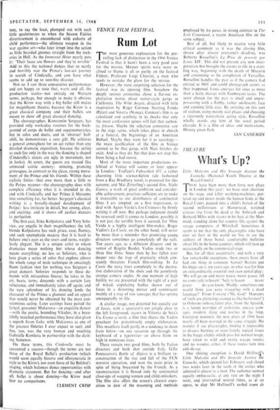Rum Lot
VENICE FILM FESTIVAL THE most generous explanation for the pre- vailing lack of distinction in the 1966 Venice Festival is that it hasn't been a very good year for the movies. Meaner spirits were more in- clined to blame it all or partly on the festival Fiihrer, Professor Luigi Chiarini, a man who tends to mistake the glum for the serious.
However, the most surprising selection for the festival was its opening film. Somehow the deeply serious committee chose a flat-out ex- ploitation movie about motor-cycle gangs in California, The Wild Angels. directed with little inspiration by Roger Corman. Starring Fonda (Peter) and Sinatra (Nancy), Corman's film is so calculated and synthetic in its shocks that only the most conformist spines will feel that authen- tic frisson. Maybe the selection committee saw in the orgy scene, which takes place in church at a funeral, the beginnings of an American Buituel. Maybe they went for it as sociology— the main justification of the film in Venice seemed to be that gangs with Nazi fetishes do exist. And so they do, but that does not stop this from being a bad movie.
Most of the more important productions ex- hibited at Venice will sooner or later appear in London : Truffaut's Fahrenheit 451, a rather charming little science-fiction tale fashioned from a Ray Bradbury novel, is promised for this autumn; and Mai Zetterling's second film, Night Games, a work of great ambition and consider- able achievement, practises sufficient sex to make it irresistible to our distributors of continental films. I am tempted. on a first impression, to deal with Agnes Varda's Les Creatures by firmly writing it off now. But perhaps judgment should be reserved until it comes to London; possibly it is not just the terrible bore it seemed, for Mme Varda is a highly intelligent film-maker. Roger Vadim's La Curee. on the other hand, will never be more than a reminder that promising young directors sometimes go completely off the rails. Ten years ago, as a debutant director and in- ventor of Brigitte Bardot, Vadim made two or three fine films. Since then he has fallen ever deeper into the trap of preciosity which con- stantly threatens French film-making. In La Curee the story loses completely to the decora- tive elaboration of the shots and the pointlessly strange camera angles. At one moment of high futility we are presented with the sight of a pair of naked, copulating bodies shown out of focus in a distorting mirror and reminiscent mainly of a tray of raw sausages that has sprung unexpectedly to life.
A similar image, not distorted but equally out of focus, with a spectator's ear crisply clear in the left foreground, occurs in Vittorio de Seta's Un Uonto a meta, a film that shares the Vadim penchant for pretentiously empty elaboration. This manifests itself partly in a tendency to shoot from below—on one occasion up through the keyboard of a typewriter—or above from on high in numerous trees.
There remain two good films, both by Italian directors and both shot outside Italy. Gillo Pontecorvo's Battle of Algiers is a brilliant re- construction of the rise and fall of the FLN terrorist operation, and won the main prize in spite of being boycotted by the French. As a reconstruction it is flawed only by sentimental close-ups of weeping women and child onlookers. The film also offers the screen's clearest expo- sition to date of the reasoning and methods employed by les paras, in strong contrast to The Lost Command, a recent American film on the same subject.
Best of all, but likely to receive very little critical comment as it was the closing film, shown after almost everyone's deadline, was Roberto- Rossellini's La Prise de pouvoir par Louis XIV. This did not present any new inter- pretation but brought the events to life in a start- ling way, beginning with the death of Mazarin and continuing to the completion of Versailles. Rossellini handles the past as if the camera had existed in 1661 and could photograph events as they happened. Louis emerges for once as more than a natty dresser with flamboyant tastes. The actor chosen for the part is small and unpre- possessing with a flabby. rather adolescent, face and cunning little eyes By insisting on this sort of realism, using mostly real places and choosing a rigorously naturalistic acting style, Rossellini wholly avoids any hint of the usual period charade. It is a film of ideas and motivations. History given flesh.
IAN CAMERON


































 Previous page
Previous page